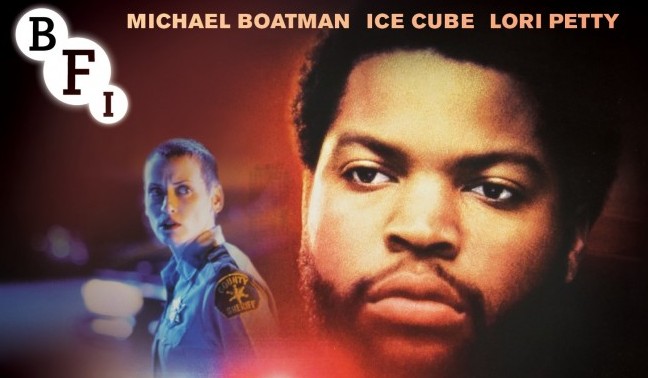
The Glass Shield (1994) Blu-ray Review

Over the years there have been many films made about police corruption. That list would include The New Centurions (1972), Serpico (1973), Colors (1988) and Training Day (2001) as well as other more recent films such as Brooklyn’s Finest (2009) and Pride and Glory (2008) creating a whole sub-genre of crime films. There is nothing new about a police corruption drama focusing on greed as well as racism. Look at the father son relationship in American History X (2000) where the son is a neo-nazi brought up by a racist and bigoted cop. Of course this is not to suggest that all police are racist but that sometimes the profession might invite a certain type of character. In this sense Charles Burnett’s The Glass Shield (1994) might not be original but does suggest that this is an oft story where the problems of corruption and institutional racism is seen time and time again in the United States (but again this is not suggesting that this problem is one peculiar to the United States). The Glass Shield is based off a true story dating from the early 1970s but was an equally relevant story in 1994 when the film was made. In LA in 1991 a story that made headlines around the world was the brutal beating on camera of Rodney King received by the LAPD, the subsequent acquittals of the police officers involved and the LA race riots that followed in 1992. More recently in the United States the Black Lives Matter movement has protested against multiple reported stories of police killings and targeting of young black men.
The film opens (after the cartoon strip opening credits – more of which later) with a new rookie, African-American cop J.J. Johnson (Michael Boatman) beginning at an LA Police Station where he comes under the close scrutiny of his colleagues and the Watch Commander (Richard Anderson, best known from the TV series, ‘The Six Million Dollar Man’). His colleagues are indifferent and a little cold towards him (although not yet overtly racist). He eventually befriends a female cop (the only one on the force), Deputy Fields (Lori Petty) who is often derided for being Jewish. On his first day on patrol with his sergeant (Linden Chiles) he stops a black woman in a red sports car and lets her off a speeding ticket. The sergeant, bitter and mistrustful of everyone admonishes him and stops the woman again, deliberately slowly issuing a ticket and, what he believes delivers a life lesson to Johnson. Slowly the idealism of this rookie cop is ebbing away and in the process he seems to be losing his identity. During an operation the unit come across a middle-aged Jewish woman murdered in a car with her husband (Elliot Gould) a witness. Fields believes that the murder is not what it might appear. Later on a routine patrol a black man carrying a gun (Ice Cube) is stopped and arrested. The station falsify the evidence and even draw Johnson into the lies to frame the black man. When it goes to court Johnson’s ethical conscience is tested.
Although the story of a corrupt police station and cops with large elements of racism may not be original, in Charles Burnett’s hands the film takes on an artistry and intelligence that is often missing from genre films. While Burnett has made very few feature films in his career since his first feature, the low budget drama Killer of Sheep in 1977 about a man who works in a slaughterhouse in LA. The opening credits has a cartoon strip intercut with the credits on a strong electric blue background (representing the police force). The cartoon strip itself is the imaginings of JJ as a policeman; interestingly here the villains are white, whereas for the majority of white police officers the criminals, or rather those they target are black. Some of the events in the comic strip happen in the film, although in a less heroic way. On one of the only extras on the disc, an interview with Burnett he talks about the relevance that the film has today, particularly in light of the Black Lives Matter movement.
The casting is also interesting. Ice Cube has only a relatively small part and was clearly designed not only to draw in a certain demograph to the film and acts as a preconceived deflection. There is an presumption that if Ice Cube is in it then he must surely be a gangster. This is deliberate on both Ice Cube and Burnett’s part. As well as being the main man in rap group NWA he had also played to type in Boyz N the Hood (1991). Perhaps more cynically Ice Cube also has the most prominent place on the films poster and, according to Burnett Miramax wanted to have more guns on the poster which Burnett correctly argued against. Boatman too is good casting as he displays the right amount of wide eyed innocence.
An interesting dual format release by BFI, following their recent Black Star series of films focusing on black talent. Apart from the interview with Burnett, the other extra is the alternate ending to the film that Burnett rejected for being too downbeat. The cast also agreed with this decision but it does add a stronger emotional ending. In an essay within the booklet by Bridget Minimore, she makes much of the use of colour in the film, relaying that blue is used prominently with the cops while red is a prominent colour with the African-Americans – red cars, lipstick etc.
Chris Hick

